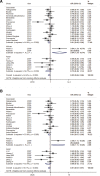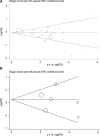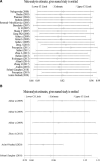The effect of AT1R-1166A/C and AT2R-1675A/G polymorphisms on susceptibility to preeclampsia: A systematic review and meta-analysis
- PMID: 36397318
- PMCID: PMC9666145
- DOI: 10.1097/MD.0000000000031008
The effect of AT1R-1166A/C and AT2R-1675A/G polymorphisms on susceptibility to preeclampsia: A systematic review and meta-analysis
Abstract
Background: The aim of this meta-analysis is to investigate the association between Angiotensin II type 1 receptor (AT1R)-1166A/C, Angiotensin II type 2 receptor (AT2R)-1675A/G polymorphisms and susceptibility to preeclampsia (PE).
Methods: Online databases, including Web of Science, PubMed, EMBASE, CINAHL, CENTRAL, Scopus, Lilacs/SciELO, and Chinese National Knowledge Infrastructure, China Wan Fang, China Science and Technology Journal Database, were used to perform the literature search up to April 2022. The odds ratio (OR) and 95% confidence interval (CI) were used as effect size. The data was analyzed by Stata 15.0 software.
Results: According to the inclusion and exclusion criteria, a total of 22 case-control studies were identified, including 3524 cases and 6308 controls. Our meta-analysis showed that the AT1R -1166 A/C allele was significantly associated with susceptibility to PE (A vs C: OR = 0.82, 95% CI: 0.69-0.96, P = .013), and there was significant difference in recessive gene model (AA vs AC + CC: OR = 0.81, 95% CI: 0.67-0.97, P = .021). However, no association was found between AT2R-1675A/G polymorphism and susceptibility to PE.
Conclusion: our meta-analysis suggested that AT1R-1166A/C polymorphism had an association with susceptibility to PE, but AT2R-1675A/G polymorphism had no association with susceptibility to PE.
Copyright © 2022 the Author(s). Published by Wolters Kluwer Health, Inc.
Conflict of interest statement
The authors have no conflicts of interest to disclose.
Figures





Similar articles
-
AT2R -1332 G:A polymorphism and its interaction with AT1R 1166 A:C, ACE I/D and MMP-9 -1562 C:T polymorphisms: risk factors for susceptibility to preeclampsia.Gene. 2014 Mar 15;538(1):176-81. doi: 10.1016/j.gene.2013.12.013. Epub 2014 Jan 15. Gene. 2014. PMID: 24440243
-
Angiotensin Type 2 Receptor Gene Polymorphisms and Susceptibility to Preeclampsia.J Reprod Infertil. 2018 Apr-Jun;19(2):95-99. J Reprod Infertil. 2018. PMID: 30009143 Free PMC article.
-
Angiotensin II type 1 and 2 receptors gene polymorphisms in pre-eclampsia and normal pregnancy in three different populations.Acta Obstet Gynecol Scand. 2009;88(5):606-11. doi: 10.1080/00016340902859307. Acta Obstet Gynecol Scand. 2009. PMID: 19308748
-
The effects of gene polymorphisms in angiotensin II receptors on pregnancy-induced hypertension and preeclampsia: a systematic review and meta-analysis.Hypertens Pregnancy. 2015 May;34(2):241-60. doi: 10.3109/10641955.2015.1009543. Epub 2015 Mar 27. Hypertens Pregnancy. 2015. PMID: 25816156
-
Associations of FOXP3 gene polymorphisms with susceptibility and severity of preeclampsia: A meta-analysis.Am J Reprod Immunol. 2022 Jul;88(1):e13554. doi: 10.1111/aji.13554. Epub 2022 Apr 29. Am J Reprod Immunol. 2022. PMID: 35441756 Review.
Cited by
-
Regulation of vascular angiotensin II type 1 and type 2 receptor and angiotensin-(1-7)/MasR signaling in normal and hypertensive pregnancy.Biochem Pharmacol. 2024 Feb;220:115963. doi: 10.1016/j.bcp.2023.115963. Epub 2023 Dec 5. Biochem Pharmacol. 2024. PMID: 38061417 Free PMC article. Review.
References
-
- Sibai BM, Stella CL. Diagnosis and management of atypical preeclampsia-eclampsia. Am J Obstet Gynecol. 2009;200:481. - PubMed
Publication types
MeSH terms
Substances
LinkOut - more resources
Full Text Sources
Molecular Biology Databases
Miscellaneous

